|
|
|
Sort Order |
|
|
|
Items / Page
|
|
|
|
|
|
|
| Srl | Item |
| 1 |
ID:
116551
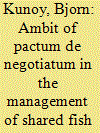

|
|
|
|
|
| Publication |
2012.
|
| Summary/Abstract |
The United Nations Convention on the Law of the Sea provides for a mechanism pursuant to which coastal States, having an interest in the fishery of a shared fish stock which straddles its maritime areas under national jurisdiction is obligated to undertake negotiations on joint conservation and management measures with the other relevant coastal States. Despite the evident benefits which arise from a joint conservation and management agreement, which can maintain or restore stocks to levels that can produce the maximum sustainable yield, such negotiations often prove difficult. However, relevant coastal States are inclined for self-interest purposes to seek to maximize their allocation which may lead to a stalemate, from which complex legal questions arise, given that the obligation to seek to agree on a conservation and management measure is an obligation of conduct, as opposed to result.
|
|
|
|
|
|
|
|
|
|
|
|
|
|
|
|
| 2 |
ID:
102585
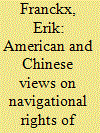

|
|
|
|
|
| Publication |
2011.
|
| Summary/Abstract |
Opposing American and Chinese views on navigational rights of warships in the exclusive economic zone (EEZ) reached a climax in 2009 with a number of incidents. Developments in 2010 indicate that the general climate between the two States in the South China Sea has not improved. By focusing on navigational rights of warships in the EEZ as well as in the territorial sea, the present contribution highlights some salient features of the relevant ocean policies of both States, some of which seem hard to square with the United Nations Convention on the Law of the Sea. After having noted that these opposing positions of China and the United States concerning navigational rights of warships are hard to reconcile at present, the article looks for possible solutions as to the future.
|
|
|
|
|
|
|
|
|
|
|
|
|
|
|
|
| 3 |
ID:
187408
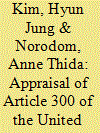

|
|
|
|
|
| Summary/Abstract |
The aim of this article is to clarify the meaning and scope of Article 300 (good faith and abuse of rights) of the United Nations Convention on the Law of the Sea (UNCLOS). Uncertainty about the meaning of Article 300 raises doubts about its raison d’être. It is insufficient to rely on the means of interpretation of treaties under Articles 31 and 32 of the Vienna Convention on the Law of Treaties and customary international law to understand Article 300 of UNCLOS. Therefore, this article analyzes relevant international cases brought before international courts and tribunals (ICTs) established under Part XV, Section 2 of UNCLOS to scrutinize the interpretation and application of Article 300. The first task of this article is to identify how ICTs have understood the structure of this provision and its character. After this general observation, this article answers the following questions: (1) Which state bears the burden of proof to invoke Article 300? (2) What conditions/steps fulfill Article 300’s invocation? (3) In which circumstances do courts uphold or reject allegations that Article 300 has been breached? This article’s findings allow for an appraisal of international judges’ interpretations of the meaning and purpose of Article 300.
|
|
|
|
|
|
|
|
|
|
|
|
|
|
|
|
| 4 |
ID:
152202
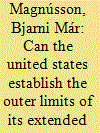

|
|
|
|
|
| Summary/Abstract |
Although most provisions of the United Nations Convention on the Law of the Sea are regarded customary international law and the United States views most of its provisions as such, the outsider status of the United States causes problems in some areas, especially concerning the continental shelf beyond 200 nautical miles. This article asks whether it is possible for the United States to establish the outer limits of its continental shelf beyond 200 nautical miles in line with international law without becoming a state party to the convention, and if that is possible, how could the United States proceed?
|
|
|
|
|
|
|
|
|
|
|
|
|
|
|
|
| 5 |
ID:
117439
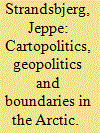

|
|
|
|
|
| Publication |
2012.
|
| Summary/Abstract |
Critical Border Studies emphasise how distinct political spaces are produced by borders. In this article I suggest that the order of this relationship should be reversed. I argue that space precedes and conditions the manifestation of borders. The argument is based on an understanding of cartography as a practice that mediates the relationship between space and borders. Drawing on Bruno Latour, I introduce the notion of cartopolitics to describe the process where questions pertaining to sovereign control over space are decided through cartography and law. In analysing current border practices in the Arctic, the term cartopolitics captures how the relationship between the United Nations Convention on the Law of the Sea and cartography is shaping the attempts by Arctic states to expand sovereign rights into the sea. The key is the continental shelf and how it is defined in law. In this process cartographic practices work to establish a particular spatial reality that subsequently serve as a basis for border making.
|
|
|
|
|
|
|
|
|
|
|
|
|
|
|
|
| 6 |
ID:
148500


|
|
|
|
|
| Summary/Abstract |
John Mearsheimer has compared China’s attitude towards the South China Sea to the Monroe Doctrine of the United States. Mearsheimer does not accord international law much weight and certainly does not regard it as determinative of political outcomes. But many observers of China’s disputes in the South China Sea look to international law for rules and processes that could facilitate peaceful resolution of the disputes. In doing so they are variously puzzled, bemused, and/or angered by China’s assertion of the nine-dash line (南海九段线). This article draws more broadly on the literature on the Monroe Doctrine, viewing the doctrine as: a unilateral pronouncement of foreign policy; representing resistance; embedded in domestic as opposed to international law; and an assertion of legitimate regional hegemony. Through applying the analogy of the Monroe Doctrine, the article seeks fresh insights into China’s legal position in relation to the South China Sea and into the significance of the nine-dash line in terms of international law.
|
|
|
|
|
|
|
|
|
|
|
|
|
|
|
|
| 7 |
ID:
110908
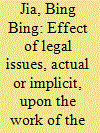

|
|
|
|
|
| Publication |
2012.
|
| Summary/Abstract |
The mandate and working procedure of the Commission on the Outer Limits of the Continental Shelf (CLCS) are defined primarily by Article 76(8) and Annex II of the United Nations Convention on the Law of the Sea (UNCLOS). The nature of the work of this body is a mixture of technological, scientific and legal elements. The question arises in practice as to what legal effect, if any, the CLCS's recommendations will have on points of law that concern the interpretation and application of the UNCLOS. Article 76(8) and other instruments related to the CLCS's work leave certain issues undefined, such that disputes between States in the delineation of the outer limits of a continental shelf may result in limits which lack both finality and binding force. It is suggested that to avoid that situation, general acceptance by other States concerned is necessary, and that the CLCS may consider referring a legally disputed point for another competent body to determine, before it proceeds with the making of recommendations.
|
|
|
|
|
|
|
|
|
|
|
|
|
|
|
|
| 8 |
ID:
175493


|
|
|
|
|
| Summary/Abstract |
This article examines the Brazilian interpretation and application of Article 121 of the United Nations Convention on the Law of the Sea (UNCLOS) through analysis of the St. Peter and St. Paul insular features, historically considered as a group of rocks. Prior to the entry into force of UNCLOS, Brazil implemented a three-step process to change the legal status of these features in order to claim an exclusive economic zone and continental shelf. More recently, Brazil has strengthened its basis of claim through the employment of straight baselines and the establishment of a large-scale marine protected area around St. Peter and St. Paul. It is argued that Brazil has used a flexible understanding of the human habitation requirement and relied on debatable state practice in order to maximize its maritime areas around these features.
|
|
|
|
|
|
|
|
|
|
|
|
|
|
|
|
| 9 |
ID:
107080
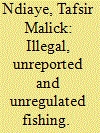

|
|
|
|
|
| Publication |
2011.
|
| Summary/Abstract |
West Africa enjoys exceptionally good climatic and ecological conditions. Its coastal and maritime areas are among the richest fishing grounds in the world. These maritime waters have a high biological productivity due to the rising of deep, nutrient-rich waters at the basis of the marine food chain. This phenomenon, known as "upwelling", is caused by winds pushing the surface waters away from the land area, allowing waters from the deep ocean to rise to the surface. One of the major features of the region, from Mauritania to Cape Shilling, is the abundance of fisheries resources. The fishing industry in the sub-region has been going through a crisis since 1990 due to overfishing, overexploitation by fishermen, industrial fishing companies and especially the highly disturbing incidence of illegal, unreported and unregulated fishing. This paper looks into the applicable law through the treaty law and the case law prior to discussing States' practice in the sub-region. The latter is reflected in the laws and regulations of these States that give effect to the United Nations Convention on the Law of the Sea and that govern fishing activities in areas under national jurisdiction. State practice is also reflected in bilateral agreements between States to establish the conditions for access of foreign vessels to living resources in the exclusive economic zones. Various inter-governmental arrangements have also been developed to ensure the management of resources in the maritime region of West Africa covered by the Sub-Regional Fisheries Commission.
|
|
|
|
|
|
|
|
|
|
|
|
|
|
|
|
| 10 |
ID:
070567
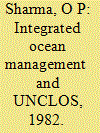

|
|
|
| 11 |
ID:
120611
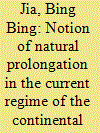

|
|
|
|
|
| Publication |
2013.
|
| Summary/Abstract |
The juridical continental shelf (CS), in terms of Article 76(1) of the United Nations Convention on the Law of the Sea (the LOS Convention), relies for its existence on the presence of a continental margin, which in turn depends on the existence of a natural prolongation. This is the principle expounded by this article, in the light of the provisions of Article 76(1) and (3) of the LOS Convention and other types of evidence of State practice. The prolongation, being geological in nature, is a necessary element underlying any claim to a juridical CS. Thus, in litigations, evidence must be led of its existence in support of such a claim. Even if the degree of influence exerted by the doctrine of natural prolongation upon the entitlement to the juridical CS and the delimitation of that entitlement between opposite or adjacent States are yet to be made clear in practice, the doctrine still has a separate life, of increasing importance, in today's legal regime of the CS. This is said in spite of the International Court of Justice (ICJ) judgment in Libya/Malta that emphasizes the distance criterion in respect of the continental shelf within 200 nm. The International Tribunal for the Law of the Sea (ITLOS) judgment in the recent Bangladesh/Myanmar delimitation case has provided an interesting interpretation of the notion of natural prolongation, and implicitly confirmed the relevance of the notion to the entitlement to the continental shelf in question. The case law in this regard has been significant, but other categories of State practice are also evolving that may underlie a new trend of giving the notion of natural prolongation a renewed, prominent place in this field.
|
|
|
|
|
|
|
|
|
|
|
|
|
|
|
|
| 12 |
ID:
184592
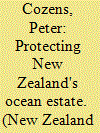

|
|
|
|
|
| Summary/Abstract |
The nation's maritime estate claimed, and ratified, under the provisions of the United Nations Convention on the Law of the Sea is more than fifteen times the area of its landmass. There are vital foreign policy, economic, environmental and security considerations associated with this priceless asset. Oceans policy is a difficult and challenging issue that previous administrations have tried to instigate but without success. This does not mean it cannot be successfully developed and articulated. A specific policy and a government agency for maritime affairs are necessary to face strategic challenges and optimise opportunities for New Zealand's future.
|
|
|
|
|
|
|
|
|
|
|
|
|
|
|
|
| 13 |
ID:
106155
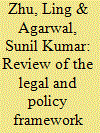

|
|
|
| 14 |
ID:
144318
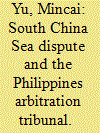

|
|
|
|
|
| Summary/Abstract |
The Philippines Arbitration Tribunal separately dealing with the jurisdiction over the South China Sea dispute is the continuance of the set practice by the United Nations Convention on the Law of the Sea's Annex VII arbitral tribunals of bifurcation of proceedings, and was the best option for it to deal with China's objections to its jurisdiction in the circumstance of China's non-acceptance of and non-participation in the arbitral proceedings. Such a measure has potentially important implications for the tribunal itself and for China. The tribunal's decision to have jurisdiction over some parts of the Philippines’ submissions resumed the merits proceedings of the dispute. This development of the proceedings would force China to reconsider its current policy of non-participation. Participation in the subsequent merits proceedings might be the right choice for China.
|
|
|
|
|
|
|
|
|
|
|
|
|
|
|
|
| 15 |
ID:
078727
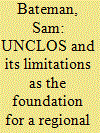

|
|
|
| 16 |
ID:
159408
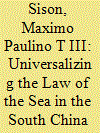

|
|
|
|
|
| Summary/Abstract |
This article argues that a resolution of the maritime disputes in the South China Sea must be based upon a universalist framework where the maritime interests of the world are upheld. The article discusses the universalist framework of the 1982 United Nations Convention on the Law of the Sea (UNCLOS) and the universalist approach taken by the Tribunal on 12 July 2016 in the South China Sea Arbitration regarding the extinguishment of a state's “exceptionalist” maritime claims and the adoption of strict criteria for the characterization of features at sea.
|
|
|
|
|
|
|
|
|
|
|
|
|
|
|
|
|
|
|
|
|